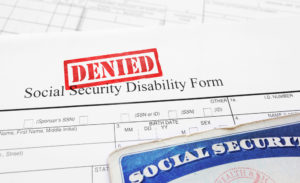Many New Yorker’s are paid under the table for work. This means they are paid cash by the employer. Neither the employer nor the employee pays taxes on the money earned. They do this to save money in the short-term, but this practice can have long-term implications.
Your eligibility for unemployment benefits, Social Security, and disability benefits is based on your earnings and work history. If you’re not reporting any income, not paying any taxes, or have no proof of employment, then you are missing out on many financial benefits that you will likely rely on as you get older. What happens if you lose your job? What if you become disabled and cannot work? How will you get retirement benefits?
Getting paid under the table presents some difficulties when it comes to these situations, which is why you should always opt to get paid legally. So, what happens if you have been paid under the table and suddenly cannot work?
Do I Qualify for Disability if I’m Paid Under the Table?
If you are not paying taxes, you will not qualify for Social Security Disability Insurance (SSDI). This insurance requires you to meet certain work requirements. Generally, you will need 40 work credits, with 20 earned in the last decade. You can receive up to four credits per year. You will not be able to meet these requirements if you are being paid under the table.
There is a way around this, however. If you are paid under the table, you can still report the income to the IRS. When you file your taxes, you can claim the income as miscellaneous or self-employment wages. You will then pay Social Security taxes on this income, which helps you earn credits toward SSDI.
If you fail to report your income, there is another option. You may be able to receive disability benefits from SSI, which is a disability program based on need. Supplemental Security Income (SSI) offers disability benefits to the disabled as well as people of all ages. However, if you are looking to receive benefits due to a disability, you must meet strict income and resource limits to be eligible.
Other Ramifications
Unreported employment can affect you in other ways. If you lose your job, you will not be able to receive unemployment benefits. If you are injured on the job, you will not be able to receive workers’ compensation. You will not be eligible for any Social Security benefits when you retire. Therefore, the sooner you rectify the situation, the greater the protection you will receive in the years to come.
Contact a New York Attorney for Unreported Employment
Many workers and employers prefer to pay and get paid in cash for work. While this may help them avoid taxes, it can affect them long-term if they become disabled. It also affects retirement benefits as well as unemployment benefits.
Unreported employment can affect your income for years to come. You should report any employers who insist on paying you in cash. You legally cannot be retaliated against. The experienced New York employment law attorneys at Ricotta & Marks, P.C. can protect your rights. To learn more about your options, call (716) 301-2704 to schedule a consultation.
The post How Do Social Security & Disability Work If I’m Paid Under the Table? appeared first on Ricotta & Marks, P.C..


